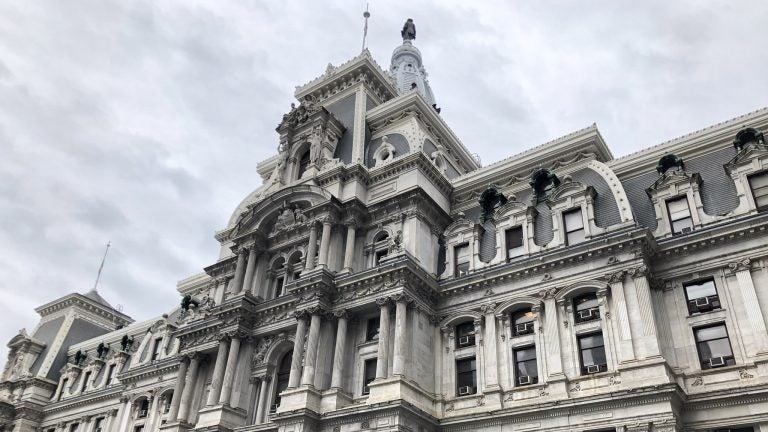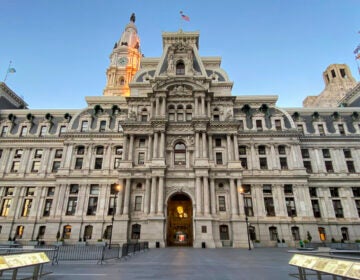Philly City Council passed a $5 billion budget. Here’s what’s in it
The spending plan includes new money for efforts to combat the opioid crisis and gun violence in Philly, plus job training for young city residents.

Philadelphia City Hall (Danya Henninger/Billy Penn)
Philadelphia City Council put its final seal of approval on the $5 billion fiscal year 2020 Operating and Capital budgets Thursday, marking a $300 million increase since last year.
The city enjoyed a healthy and growing tax base, allowing the budget increases to be accomplished without property tax increases this year. Some property owner groups, however, have argued that the city’s uneven tax assessment process enabled a back-door increase.
Much of the increase is a result of pay increases negotiated with Philadelphia’s municipal labor unions and typical growth in pension and health care costs for city workers. The Kenney administration also secured a $130 million for the school district and an over $34 million contribution to the city’s rainy day fund.
A host of smaller items are buried in the massive budget, however, including new funding for a variety of departments and programs to combat the opioid crisis ($7.6 million) and the city’s epidemic of gun violence ($6 million), as well as $3 million for job training for young city residents.
New money for affordable housing, homestead exemption
Councilwoman Maria Quiñones-Sánchez said the budget passed Thursday also reflected that council had won the debate with the Kenney administration over funding for affordable housing, which began last year. Originally, the city’s contributions to its housing trust fund were supposed to grow smaller over the years.
“Getting the housing trust fund to $20 million a year is huge because we’ve been having that debate between $70 million and $100 million and I think this means I win,” said Quiñones-Sánchez.
The city’s Office of Homeless Services will receive an additional $800,000 as well.
City Council members secured a variety of other smaller wins. Councilwoman Helen Gym successfully sought an increase in funding for anti-eviction programs. Last year, the city gave $850,000 to such efforts, but this year the number will go up to $1.5 million.
Gym introduced legislation earlier this year to establish a right to counsel, which would guarantee low income tenants a lawyer in eviction court. It would require about $5 million annually to fully fund such a program.
“Right to counsel is not just about all the money coming in at once,” said Gym. “This is going to evolve in a very purposeful and steady way to match the funds. We don’t need all of this on the front end because we need a lot more time to plan this out.”
The single largest budget item that council won in negotiations with the mayor’s office is $15 million to expand the “homestead exemption,” which allows property owners to deduct a certain amount from their property tax assessments when they calculate their tax bills. Legislation introduced by Republican City Councilman Brian O’Neill would raise the amount that can be deducted to $45,000 from $40,000. (The city will also send $8 million to the Philadelphia School District, which splits every property tax dollar with the city, to ensure it doesn’t lose out on income as a result of the increased homestead exemption.)
Street-cleaning and neighborhood improvements
The city’s Commerce Department secured $2.5 million to support the cleaning of neighborhood commercial corridors.
“I am delighted to see that my additional $2 million ask for cleaning and management of neighborhood commercial corridors has been incorporated into this year’s budget,” Councilwoman Charelle Parker said in a statement. “I am confident that the city will see the fruit of this investment.”
Another $2 million was secured for the city’s programming and maintenance of vacant lots, a particular interest of City Council President Darrell Clarke, whose district contains a substantial proportion of the city’s abandoned land. Programs like the Roots To Reentry Initiative, which trains recently incarcerated people in landscaping and related professions, are included in that number.
Council secured an extra $1.6 million for the Streets Department, to be spent on LED street lights, emergency remediation for deteriorating retaining walls, and an additional bump on the street-cleaning budget to allow for the purchase of smaller street-sweeping vehicles.
The Department of Licenses and Inspections will see budget growth as well, securing five new plans examiners to help accommodate the growing number of construction applications the city is facing. The budget also includes an additional $2 million for demolition funding, to accelerate the razing of dangerous buildings.
Some other notable city institutions won increases as well, including the Zoning Board of Adjustment, which will receive $175,000 for increased staffing.
The Free Library, however, which was seeking a dramatic increase in funding of up to $15 million per year, will only receive $3.5 million. It is anticipated that six-day service will return to all branches by fiscal year 2021.
“We applaud City Council for today’s vote on a spending plan that represents the priorities of the residents of Philadelphia,” said Mayor Jim Kenney in a statement.
The new fiscal year begins July 1.
WHYY is your source for fact-based, in-depth journalism and information. As a nonprofit organization, we rely on financial support from readers like you. Please give today.





